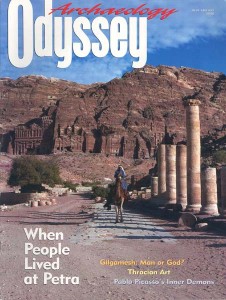Immortality—Gilgamesh as Hero vs. Gilgamesh as God
Sidebar to: Gilgamesh
The latest version of the epic, the Standard Babylonian 12-tablet version (mid-first millennium B.C.E.), simply added a tablet to the 11-tablet version. This tablet prepares Gilgamesh for his death and journey to the underworld, where he will pass judgment over the dead. The epic is thus given a more religious tone; it suggests that the meaning of life lies not so much in earthly pleasures or kingship as in becoming divine. The following passage, in which the high god Enlil addresses Gilgamesh, is from an early Sumerian tale:
O Bilgames [Gilgamesh], I made your destiny a
destiny of kingship, but I did not make it [a destiny]
of eternal life.
For mankind, whatever life it has, be not sick at heart,
be not in despair, be not heart-stricken!
The bane of mankind is thus come, I have told you,
what (was fixed) when your navel-cord was cut is thus come,
I have told you.
The darkest day of mortal man has caught up with you,
the solitary place of mortal man has caught up with you,
the flood-wave that cannot be breasted has caught up with
you,
the battle that cannot be fled has caught up with you,
the combat that cannot be matched has caught up with you,
the fight that shows no pity has caught up with you …
Go ahead, when the great Anunna gods sit down to the
funerary banquet …
[to] the place where your father is, and your grandfathers,
your mother, your sisters, your siblings,
Already a library member? Log in here.
Institution user? Log in with your IP address.

